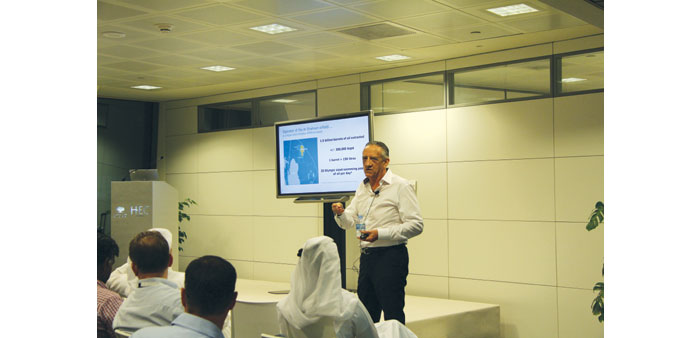Affleck speaking at the ‘HEC Paris Guest Lecture’ series at the Tornado Tower in Doha recently.
Utilising its technology and experience, Maersk Oil Qatar (MOQ) has been able to produce more than 1.5bn barrels of oil from the offshore Al Shaheen oilfield and make a significant economic contribution to Qatar, said its managing director Lewis Affleck.
Affleck was speaking at the ‘HEC Paris Guest Lecture’ series recently, sharing his extensive experience in the Oil & Gas industry with master degree students and alumni at the prestigious business school’s Doha campus.
As the largest offshore oil producer in Qatar, MOQ has a “unique understanding” of Al Shaheen, which is one of the world’s most complex oilfields, he said.
“In support of realising Qatar’s National Vision 2030 and in close partnership with our partner Qatar Petroleum, our focus in Maersk Oil is on the wise management of the country’s natural resources to help maximise recovery and deliver a stable production plateau from the Al Shaheen field,” Affleck said.
“We currently produce around 300,000 barrels of oil per day, which is over one third of Qatar’s daily oil production,” Affleck said.
Affleck walked the audience through his role as an executive at Maersk Oil, part of A.P. Moller-Maersk Group — one of the world’s largest conglomerates — and his views on creating and driving value, particularly in a low oil price environment.
“Delivering value begins with understanding the context that you are operating in. Maersk is not only committed to delivering tangible contributions to the economy and society today, but we’re committed to Qatar for generations to come,” he said.
“Ensuring the safety of company operations and staff is our number one priority,” he asserted. “Safety is a pre-requisite for a successful business and the mindset and processes involved in ensuring a safe environment are quite similar to what it takes to run an effective organisation. We are very pleased with the safety culture at Maersk Oil Qatar but there is always more that can be done. As leaders and future leaders – it should always be our goal to further improve performance,” he said. Maersk Oil introduced its global ‘Incident-free’ programme in 2011, with an aim to transform the company’s safety culture and performance in two ways: focusing on the personal aspects of safety; and setting up technical processes and competencies that are needed to run an incident-free organisation.
“Based on my experience, I believe at the heart of every organisation are its values” Affleck emphasised. “Company values are integral to drive the way you do business. You also need an ambitious vision to articulate where you want to go and a strategy which sets out what you want to achieve and how,” he said.
Affleck said a successful business strategy was underpinned by a set of processes, governance procedures, supported by “your people, your culture, and your ways of working.”
“ It’s important that you also set clear key performance indicators (KPI’s) that allow you to monitor and drive performance and that you develop an operating rhythm that establishes very clearly how the business works” explained Affleck, sharing his experience and a number of practical examples.
In closing, he shared how Maersk Oil and the Maersk Group were mounting a robust response to the current low oil price environment, not only seeking to sustainably reduce costs, but also pursuing growth opportunities.
“It’s a difficult and challenging time for our industry, but with challenge, also comes opportunity.” Maersk Oil has sanctioned two mega-projects this year – Culzean in the United Kingdom and Johan Sverdrup in Norway, both of which are expected to benefit from lower commodity prices during their construction period.
“We also announced an acquisition in Africa recently – so despite the current low oil price environment and our focus on cost transformation, opportunities still exist for efficient businesses to grow,” Affleck added.

